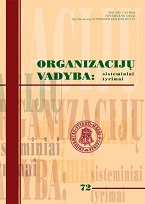Organizacijų kultūrų tyrimai: problemos ir galimybės
Organization culture research: challenges and opportunities
Author(s): Dovilė Dilienė, Sonata StaniulienėSubject(s): Economy
Published by: Vytauto Didžiojo Universitetas
Keywords: Organizacijų kultūra; Organizacijos kultūros tyrimas Organization culture; Corporate culture research
Summary/Abstract: Šiandien organizacijų kultūra kiekvienai organizacijai yra svarbus veiksnys, skatinantis tiek darbuotojų lojalumą / nelojalumą, tiek ir įmonės veiklos efektyvumą. Organizacinei kultūrai net suteikiama ypatinga, socialinių klijų, metafora. Sėkmingiausios pasaulio įmonės pasižymi išskirtine organizacine kultūra, todėl pastaruoju metu tapo itin madinga tirti, keisti ir kopijuoti kitų organizacijų kultūras. Svarbu paminėti, jog organizacinės kultūros keitimas yra ne vienadienis žingsnis, o ilgas procesas, visų prima prasidedantis nuo organizacijos kultūros tyrimo. Šiame straipsnyje bus apžvelgiamos organizacinės kultūros tyrimo problemos ir galimybės, pateikiamas organizacinių kultūrų tipų klasifikavimas bei rekomenduojamas organizacinės kultūros tyrimo organizavimas. Today organization’s corporate culture is becoming an increasingly important factor for employee loyalty / disloyalty, as well as company performance. Organization culture has been even given an extraordinary name as social glue. Moreover, the most successful companies in the world have a unique organization culture, and it has recently become very fashionable to research, modify and even copy other organizations’ cultures. It is important to note that the change of organization culture is not a one-day move. It is a lengthy process, particularly starting from the study and research of organization culture. This article focuses on organization culture, its research problems and opportunities, the organization cultural types of classification, and the recommended study of organization culture in the organization. Organization culture is seen as a dynamic, constantly changing and heterogeneous phenomenon. Various researchers for their studies and research distinguish several levels of organization culture. For the study of organization culture is crucial to choose appropriate research methods, as to obtain a true picture of organization culture. Researchers recommend using not one, but several research methods that are properly matched among each other. The simplest method of analysis to group is the qualitative and quantitative. Scientists still have not agreed what are the best methods available to explore the culture of the organization – both have advantages and disadvantages. Therefore, exploring the culture of the organization there should be used both methods, using advantages of both methods. Each organization’s culture is unique; however, researchers studying a variety of organization cultures have distinguished their typologies. Anthropologically each culture has its cultural uniqueness in a certain cultural field. This unique feature makes organization culture impossible to be copied, because one organization even physically is not able to copy the other organization’s cultural dimensions. Therefore it is particularly difficult to investigate and make a typology of organization cultures: on the one hand, one needs to discover the uniqueness of each culture, on the other han
Journal: Organizacijų vadyba: sisteminiai tyrimai
- Issue Year: 2014
- Issue No: 72
- Page Range: 79-93
- Page Count: 15
- Language: Lithuanian

